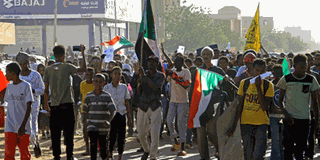Clashes in Sudan's Darfur kill 24

Sudanese protesters take part in a demonstration in southern Khartoum on April 6, 2023 marking a key anniversary in the decades-old struggle against military rule with new protests against the general. PHOTO | AFP
What you need to know:
- The violence prompted Sudanese authorities to declare a night curfew and a month-long state of emergency across West Darfur.
Clashes between Arab and non-Arab groups in Sudan's Darfur region have left at least 24 people dead, dozens of homes burned, and thousands displaced, an official said on Wednesday.
The latest violence in Sudan's westernmost region near Chad erupted between members of Arab tribes and the Masalit non-Arab group in the town of Foro Baranga, about 185 kilometres (115 miles) from Geneina the capital of West Darfur state.
"The death toll has reached around 24 people on both sides," according to Mohammed Hussein Teeman, of the Foro Baranga community council.
He said the fighting broke out Saturday.
The violence prompted Sudanese authorities to declare a night curfew and a month-long state of emergency across West Darfur.
Security forces have been dispatched over the past days and the situation had calmed by Wednesday, he said.
About 50 homes were burned in the Foro Baranga area, "leading to the displacement of an estimated 4,000 families (about 20,000 people)," according to the United Nations Office for the Coordination of Humanitarian Affairs (OCHA).
Ethnic clashes often break out in Darfur, a vast region the size of France which was ravaged by a civil war that erupted in 2003.
That conflict pitted ethnic minority rebels against the Arab-dominated government of then-president Omar al-Bashir. Khartoum responded by unleashing the notorious Janjaweed militia, recruited from among the region's mainly Arab nomadic peoples.
Around 300,000 people were killed and 2.5 million displaced, according to the United Nations.
Rights groups say many of the Janjaweed's members were integrated into the feared paramilitary Rapid Support Forces, commanded by Mohamed Hamdan Daglo, now de facto deputy leader of Sudan.
Experts have said tribal conflicts increased in Sudan after the 2020 end of a UN-African Union peacekeeping mission, and in a security vacuum following the 2021 coup led by army chief Abdel Fattah al-Burhan.
Throughout Sudan last year, such conflicts killed around 900 people and displaced almost 300,000, OCHA said.
Last April, senior Janjaweed militia leader Ali Muhammad Ali Abd al-Rahman, also known by the nom de guerre Ali Kushayb, faced the Hague-based International Criminal Court in its first trial for war crimes in Darfur.
Bashir, who has been in custody in Khartoum since his 2019 ouster, has been wanted by the ICC for more than a decade over charges of genocide, war crimes and crimes against humanity in Darfur.





